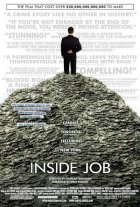
Inside Job Page #15
JOHN CAMPBELL:
Hm, ye-, well – yeah; basically irrelevant.02:
30:34.18CHARLES FERGUSON: You've written a very large number of articles, about a very
wide array of subjects. You never saw fit to investigate the risks of unregulated credit
default swaps?
MARTIN FELDSTEIN: I never did.
CHARLES FERGUSON: Same question with regard to executive compensation; uh, the
regulation of corporate governance; the effect of political contributions –
MARTIN FELDSTEIN: What, uh, what, uh, w-, I don't know that I would have anything to
add to those discussions.
02:
31:00.29CHARLES FERGUSON: I'm looking at your resume now. It looks to me as if the
majority of your outside activities are, uh, consulting and directorship arrangements with
the financial services industry. Is that, would you not agree with that characterization?
02:
31:15.10GLENN HUBBARD:
No, to my knowledge, I don't think my consulting clients are evenon my CV, so –
CHARLES FERGUSON: Uh, who are your consulting clients?
GLENN HUBBARD:
I don't believe I have to discuss that with you.CHARLES FERGUSON: Okay. Uh, uh –
Inside Job transcript – Sony Pictures – September 2010
66
GLENN HUBBARD:
Look, you have a few more minutes, and the interview is over.02:
31:30.09CHARLES FERGUSON: Do you consult for any financial services firms?
FREDERIC MISHKIN: Uh, the answer is, I do.
CHARLES FERGUSON: And –
FREDERIC MISHKIN: And, but I d-, I do not want to go into details about that.
02:
31:39.09CHARLES FERGUSON: Do they include other financial services firms?
GLENN HUBBARD:
Possibly.CHARLES FERGUSON: You don't remember?
GLENN HUBBARD:
This isn't a deposition, sir. I was polite enough to give you time;foolishly, I now see. But you have three more minutes. Give it your best shot.
02:
31:54.25NARRATOR:
In 2004, at the height of the bubble, Glenn Hubbard coauthored a widelyread paper with William C. Dudley, the chief economist of Goldman Sachs. In the paper,
Hubbard praised credit derivatives and the securitization chain, stating that they had
improved allocation of capital, and were enhancing financial stability. He cited reduced
volatility in the economy, and stated that recessions had become less frequent and
milder.
Credit derivatives were protecting banks against losses, and helping to distribute risk.
02:
32:29.02CHARLES FERGUSON: A medical researcher writes an article, saying: to treat this
disease, you should prescribe this drug. It turns out Doctor makes 80 percent of
personal income from manufacturer of this drug. Does not bother you.
JOHN CAMPBELL:
I think, uh, it's certainly important to disclose the, um – the, um –02:
32:54.00 Well, I think that's also a little different from cases that we are talking abouthere. Because, um – um –
Inside Job transcript – Sony Pictures – September 2010
67
{THE PRESIDENTS OF HARVARD UNIVERSITY
AND COLUMBIA UNIVERSITY REFUSED TO COMMENT
ON ACADEMIC CONFLICTS OF INTEREST.
BOTH DECLINED TO BE INTERVIEWED FOR THIS FILM.}
02:
33:15.19CHARLES FERGUSON: So, uh, what do you think this says about the economics
discipline?
CHARLES MORRIS:
Well, heh heh, heh, it has no relevance to anything, really. And,and fe-, indeed, I think, um, it's a part of the, it's a s-, important part of the problem.
02:
33:32.23 {PART V: WHERE WE ARE NOW}02:
33:47.10NARRATOR:
The rising power of the U.S. financial sector was part of a wider change inAmerica. Since the 1980s, the United States has become a more unequal society, and
its economic dominance has declined. Companies like General Motors, Chrysler, and
U.S. Steel — formerly the core of the U.S. economy — were poorly managed, and falling
behind their foreign competitors. And as countries like China opened their economies,
American companies sent jobs overseas to save money.
02:
34:24.15DANIEL ALPERT:
For many, many years, the 660 million people in the developed worldwere effectively sheltered from all of this additional labor that existed on the planet.
Suddenly, the Bamboo Curtain and the Iron Curtain are lifted; and you have 2.5 billion
additional people.
02:
34:41.16NARRATOR:
American factory workers were laid off by the tens of thousands.DANIEL ALPERT:
Our manufacturing base was destroyed, literally over the course of afew years.
02:
34:49.23NARRATOR:
As manufacturing declined, other industries rose. The United States leadsthe world in information technology, where high-paying jobs are easy to find. But those
Inside Job transcript – Sony Pictures – September 2010
68
jobs require an education. And for average Americans, college is increasingly out of
reach.
02:
35:07.26 While top private universities like Harvard have billions of dollars in theirendowments, funding for public universities is shrinking, and tuition is rising. Tuition for
California's public universities rose from 650 dollars in the 1970s to over 10,000 dollars
in 2010.
02:
35:29.04 Increasingly, the most important determinant of whether Americans go tocollege is whether they can find the money to pay for it.
Meanwhile, American tax policy shifted to favor the wealthy.
02:
35:41.21{OCTOBER 11, 2006}
GEORGE W. BUSH:
When I first came to office, I thought taxes were too high; and theywere.
NARRATOR:
The most dramatic change was a series of tax cuts designed by GlennHubbard, who at the time was serving as President Bush's chief economic advisor. The
Bush administration sharply reduced taxes on investment gains, stock dividends, and
eliminated the estate tax.
02:
36:04.05GEORGE W. BUSH:
We had a comprehensive plan that, when acted, has left nearly 1.1trillion dollars in the hands of American workers, families, investors, and small business
owners.
02:
36:14.05NARRATOR:
Most of the benefits of these tax cuts went to the wealthiest 1 percent ofAmericans.
GEORGE W. BUSH:
And by the way, it was really the cornerstone, in many ways, of oureconomic recovery policy.
02:
36:25.23NARRATOR:
Inequality of wealth in the United States is now higher than in any otherdeveloped country.
American families responded to these changes in two ways: by working longer hours,
and by going into debt.
Inside Job transcript – Sony Pictures – September 2010
69
RAGHURAM RAJAN:
As the middle class falls further and further behind, there is apolitical urge to respond by making it easier to get credit.
{OCTOBER 13, 2002}
GEORGE W. BUSH:
You don't have to have a lousy home. The low-income homebuyer can have just as nice a house as anybody else.
NARRATOR:
American families borrowed to finance their homes, their cars, theirhealthcare, and their children's educations.
02:
37:10.09CHARLES MORRIS:
People in the bottom 90 percent lost ground between 1980 and2007. It all went to the top 1 percent.
NARRATOR:
For the first time in history, average Americans have less education andare less prosperous than their parents.
Translation
Translate and read this script in other languages:
Select another language:
- - Select -
- 简体中文 (Chinese - Simplified)
- 繁體中文 (Chinese - Traditional)
- Español (Spanish)
- Esperanto (Esperanto)
- 日本語 (Japanese)
- Português (Portuguese)
- Deutsch (German)
- العربية (Arabic)
- Français (French)
- Русский (Russian)
- ಕನ್ನಡ (Kannada)
- 한국어 (Korean)
- עברית (Hebrew)
- Gaeilge (Irish)
- Українська (Ukrainian)
- اردو (Urdu)
- Magyar (Hungarian)
- मानक हिन्दी (Hindi)
- Indonesia (Indonesian)
- Italiano (Italian)
- தமிழ் (Tamil)
- Türkçe (Turkish)
- తెలుగు (Telugu)
- ภาษาไทย (Thai)
- Tiếng Việt (Vietnamese)
- Čeština (Czech)
- Polski (Polish)
- Bahasa Indonesia (Indonesian)
- Românește (Romanian)
- Nederlands (Dutch)
- Ελληνικά (Greek)
- Latinum (Latin)
- Svenska (Swedish)
- Dansk (Danish)
- Suomi (Finnish)
- فارسی (Persian)
- ייִדיש (Yiddish)
- հայերեն (Armenian)
- Norsk (Norwegian)
- English (English)
Citation
Use the citation below to add this screenplay to your bibliography:
Style:MLAChicagoAPA
"Inside Job" Scripts.com. STANDS4 LLC, 2025. Web. 24 Feb. 2025. <https://www.scripts.com/script/inside_job_42>.







Discuss this script with the community:
Report Comment
We're doing our best to make sure our content is useful, accurate and safe.
If by any chance you spot an inappropriate comment while navigating through our website please use this form to let us know, and we'll take care of it shortly.
Attachment
You need to be logged in to favorite.
Log In